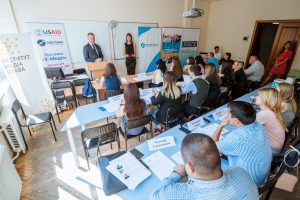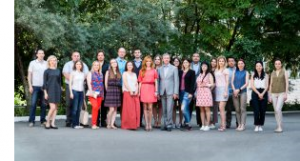
 From July 10 to 28, the Centre for Democracy and Rule of Law holds the Summer School of Media Law – an educational project for media lawyers. Within three weeks, 21 participants from 5 countries are undergoing an intensive course in media law.
From July 10 to 28, the Centre for Democracy and Rule of Law holds the Summer School of Media Law – an educational project for media lawyers. Within three weeks, 21 participants from 5 countries are undergoing an intensive course in media law.
During the first week of training, the Summer School held 14 lectures, sponsored by the leading Ukrainian media lawyers and experts.
At the beginning, the participants of the school got acquainted with the fundamental foundations of freedom of speech, justice and the legal system. So, Vsevolod Rechitsky, a member of the Constitutional Commission of Ukraine, spoke about the standards of freedom of speech and press in the USA, which is an example for the developed countries. The theme of Andrii Richter’s lecture, Senior Advisor to the Office of the OSCE Representative on Freedom of the Media, was the evolution of the concept of freedom of speech, and Stanislav Shevchuk, judge of CCU, spoke about the role of the case law.
Three lectures of the first week were devoted to the freedom of expression and the notion of defamation. Taras Shevchenko, Director of CEDEM, analyzed the various aspects of these concepts, as well as the issue of the prohibition of opinion, the delimitation of facts and appraisal judgments, and judicial practice in claims for the protection of honor and dignity. On another aspect of media law – freedom on the Internet – the school’s participants discussed with Daria Opryshko, a lawyer of the CEDEM.
Ethics was the next topic of lectures. So, Diana Dutsyk, the executive director of Detector Media, NGO, spoke about media self-regulation and ethical  standards. On the protection of private life and the limits of the invasion of the private sphere, the school’s participants spoke with Nataliia Petrova, a lawyer for the USAID New Justice Program. She also analyzed a number of “classical” lawsuits involving the media.
standards. On the protection of private life and the limits of the invasion of the private sphere, the school’s participants spoke with Nataliia Petrova, a lawyer for the USAID New Justice Program. She also analyzed a number of “classical” lawsuits involving the media.
The participants of the Summer School spoke about various aspects of copyright, including on the Internet with Alina Pravdychenko, a lawyer, head of the Education Direction of CEDEM. And media advisor Ali Safarov spoke about advertising regulation.
Another lecture was devoted to the issue of protecting the denouncers – this was stated by the media lawyer Oksana Nesterenko.
In addition to the lectures, the participants of the School also performed the practical tasks and had time to discuss issues with their colleagues and teachers.
Also, within the framework of the Summer School there was a round table on the topic “Media and Elections” with the participation of the leading Ukrainian experts. During the discussion, the participants of the Summer School told about the regulation of media work during the elections in their countries: both the legal aspects and the realities of the work of the journalists. And in the second part of the round table, they discussed the changes that Ukraine needs to ensure that the electoral process is presented in an objective and comprehensive manner.
The program of the first week included an excursion to the National Council on Television and Radio, during which the participants of the School learned about the work of the Ukrainian regulator of broadcasting.
The Project “Freedom of media in Ukraine”, implemented within the Council of Europe and European Union Programme Partnership for Good Governance is aimed to improve freedom, independence, pluralism and diversity of media in Ukraine
The Council of Europe Project “Strengthening Freedom of the Media and Establishing a Public Broadcasting System in Ukraine” aims to enhance the role of media in general and the public broadcaster in particular as instruments for consensus building in the Ukrainian society. The Project is implemented in the framework of the Council of Europe Action Plan for Ukraine 2015-2017.
The summer media law school is conducted with the support of the U.S. Agency for International Development (USAID) provided through Internews.